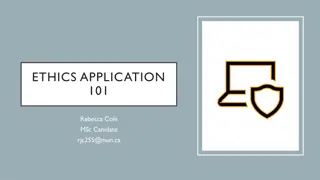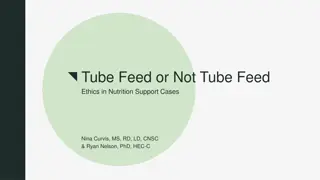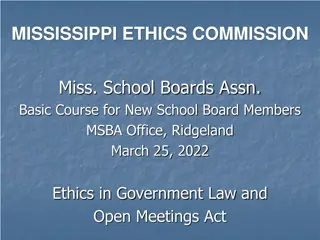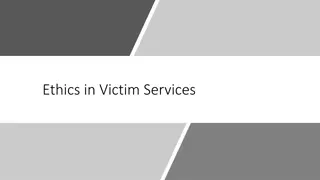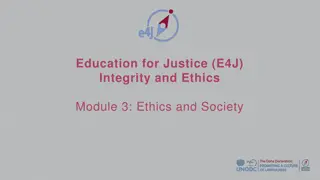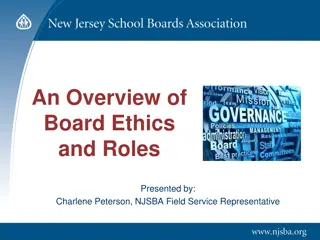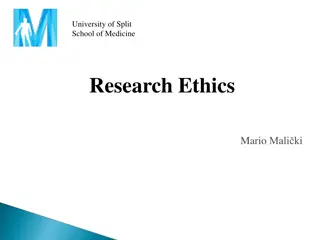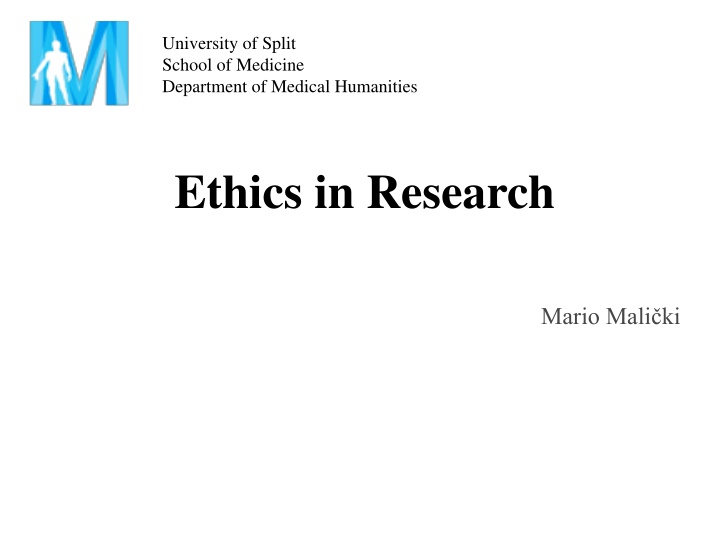
Medical Humanities and Research Ethics at University of Split School of Medicine
Explore the Department of Medical Humanities and Ethics in Research at University of Split School of Medicine, along with insights into scientific journals, integrity of research authorship, number of authors in publications, genome-wide meta-analysis, and the names of notable authors. Discover the importance of integrity in research, authorship information, and shared achievements in the field of medicine.
Download Presentation

Please find below an Image/Link to download the presentation.
The content on the website is provided AS IS for your information and personal use only. It may not be sold, licensed, or shared on other websites without obtaining consent from the author. If you encounter any issues during the download, it is possible that the publisher has removed the file from their server.
You are allowed to download the files provided on this website for personal or commercial use, subject to the condition that they are used lawfully. All files are the property of their respective owners.
The content on the website is provided AS IS for your information and personal use only. It may not be sold, licensed, or shared on other websites without obtaining consent from the author.
E N D
Presentation Transcript
University of Split School of Medicine Department of Medical Humanities Ethics in Research Mario Mali ki
Scientific Journals 36 000 1665. Journal des S avans (Paris) 1665. Philosophical Transactions (London) 1860. Slovinski prvenci o naravi i zdravlju (Hrvatska, Be ) 1869. Nature 1879. Index Medicus 1890. Science 1994. World Wide Web 1997. PubMed (PubMed Central 2000) 2000. Croatian Medical Journal 2003. PLOS >700 000 citations per year in MEDLINE
Integrity of research authorship information references reporting storing and retrieving replicating peer review
Integrity of Authorship PubMed (Authorship MeSH): The profession of writing. Also the identity of the writer as the creator of a literary production.
Number of authors Tesla N. On light and other high frequency phenomena. Mali ki M, Jeron i A, Maru i M, Maru i A. Why do you think you should be the author on this manuscript? 2900 A. Initial sequencing and analysis of the human genome. 5154 Aad, G. et al. (ATLAS Collaboration, CMS Collaboration) Phys. Rev. Lett. 114, 191803 (2015) 1920 1; WoS - 1981 - 66.2% more, 2011 89.1% (Md=5)
Genome-wide meta-analysis identifies 11 new loci for anthropometric traits and provides insights into genetic architecture.
Name of the author 1908. Student. The probable error of a mean. (c-518) 1948. Alpher RA, Bethe H, Gamow G. The Origin of Chemical Elements. (c-102) 1978. Hoover WG, Posch HA, Bestiale Stronzo (engl. total asshole) Diffusion in a periodic Lorentz gas. (c-102) 1978. Matzinger P, Galadriel Mirkwood. In a fully H-2 incompatible chimera T cells of donor origin can respond to minor histocompatibility antigens in association with either donor or host H-2 type (c-17) 1982. Bruce Le Catt. Censored Vision. 2001. AK Geim, HAMS ter Tisha, Detection of earth rotation with a diamagnetically levitating gyroscope. (c-10) 2012. Ocorrafoo Cobange (John Bohannon) 157 (61%) OA
Prestige Najbolji znanstvenici MEF-a 2014 CV h-index grants rewards tenure
Sharing achievements Increase in the number of equal contribution/shared first authorship anesthesiology, intensive care, pharmacology 2000. - 0% 2009. - 19.9% NEJM: <1% vs. 8.6% ; JAMA: 0%; vs. 7.5% Annals: 0% vs. 3.8% Lancet: <1% vs. 3.6% BMJ: 0% vs. 1.0%
Misuse of authorship Gift authorship Author cartel Ghost authorship Coercion authorship Ghost writing Byline manipulation Duplicate publication
2011 Systematic review of authorship Ana Maru i , Lana Bo njak, Ana Jeron i 118 studies: 63 cross-sectional, 32 descriptive, 5 qualitat., 2 RCT 54 dealt with perception of authorship no consensus 54 dealt with byline order: mostly depends on the amount of work: economics, math, management, physics alphabetical WoS - 32.2% 1981. - 15.9% 2011. biomedicine first author most work, mentor - last 16 studies of authorship misuse: 23% (95% CI 18% do 28%) scientist aware or experienced misuse in the West, 55% (95% CI 45% do 64%) East 5-30% editors
Authorship criteria (ICMJE) - 4 1987 International Committee of Medical Journal Editors 1) Substantial contributions to the conception or design of the work; or the acquisition, analysis, or interpretation of data for the work; AND 2) Drafting the work or revising it critically for important intellectual content; AND 3) Final approval of the version to be published; AND 4) Agreement to be accountable for all aspects of the work in ensuring that questions related to the accuracy or integrity of any part of the work are appropriately investigated and resolved. (2013)
1-63% authors would not be authors under the ICMJE criteria Byline changes up to 44% differences from abstract to full publication Contributionship Listing of all performed work by the authors, e.g.: Conceived and designed the experiments: CMS WAF. Performed the experiments: CMS WZ. Analyzed the data: CMS. Contributed reagents/materials/analysis tools: CMS. Wrote the paper: CMS SE WAF.
Integrity of Information Research misconduct means fabrication, falsification, or plagiarism in proposing, performing, or reviewing research, or in reporting research results. Fabrication make something up Falsification manipulate data Plagiarism - appropriation of another person's ideas, processes, results, or words without giving appropriate credit
FFF Fabrication or falsification - 1.7% (95% CI 1.2% do 2.4%) of researchers 30% (95% CI 17% do 46%) know someone who did it Only 0.02% of all papers RETRACTED Errata (honest mistakes) 4% of all publications, in 24% of those results/conclusions end up different
Integrity of References 2011. 34 journals 2012. 51 journals 2013. 66 journals 2014. 38 journals Thomson Reuters punished them by denying them the Impact Factor Incorrect citations 20 %, wrong style (misspells 38%) Versions and updates of articles not seen by researchers (including when studies are retracted) retracted or duplicate publications have same citation rate before and after notices are published
Integrity of Reporting Systematic review 2013: comparing trial publications to protocols 40-62% of studies had at least one primary outcome that was changed, introduced, or omitted studies that report positive or significant results are more likely to be published on average, only 50% of clinical trials that are started are published in the scientific literature
FDA (2015) of 57 studies for which the FDA found evidence of incorrect blinding, manipulation of data, or not applying inclusion or exclusion criteria only 3 studies mentioned those problems it in the published article
Integrity of storing and retrieving studies Many databases, different coverage (MEDLINE; EMBASE; DOAJ; WOS) and the problem of grey literature No ideal de-duplication software Database (indexing) errors 23% of duplicates wrongly indexed, improper MeSH terms assigned including study types




